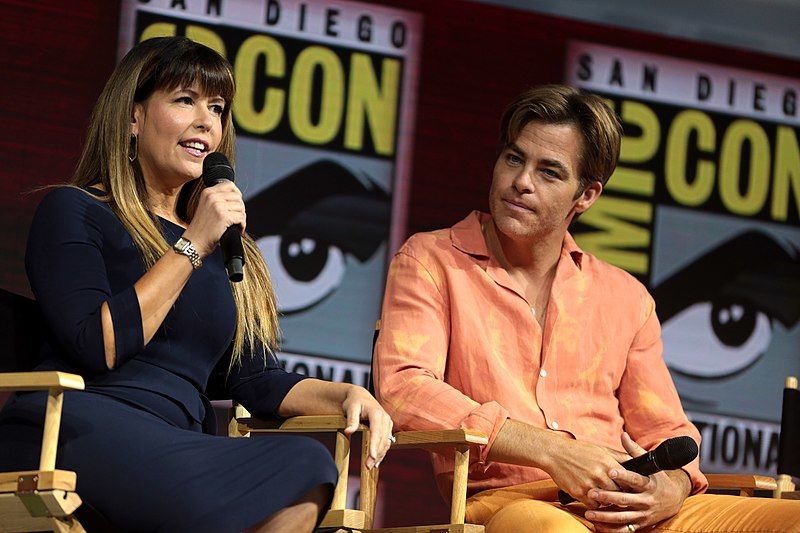Create a free profile to get unlimited access to exclusive videos, sweepstakes, and more!
How Patty Jenkins helps make Chris Pine the best Chris

The first issue of 2019 for the trade magazine Variety featured an increasingly familiar double act on the cover. Actor Chris Pine posed to the left while director Patty Jenkins sat to the right, with her arm resting against his shoulder blades. The pair were promoting the upcoming TNT series I Am the Night, inspired by the infamous Black Dahlia murders, but of course our minds first went to Wonder Woman. With the much-anticipated sequel Wonder Woman 1984 pushed back to a 2020 release, this series will be the only time we get to see another Pine-Jenkins collaboration. While the pair may only be on their second project together, their creative partnership has plenty of people excited for a variety of great reasons. Indeed, as the Lainey Gossip podcast Show Your Work noted, it's this pairing and all that it represents that may make Chris Pine the Best Chris. Patty did that!
With only two movies under her belt — 2017’s Wonder Woman and her 2003 debut, the biographical drama Monster — Jenkins has become arguably the most recognizable female director of her generation. The magnitude of Wonder Woman’s success, not just critically and financially but in terms of its cultural impact, is easy to undersell, but Jenkins was given a near-impossible task — bringing the great superheroine of comic book history to the live-action big screen for the very first time — and pulled it off with aplomb. With that film, she became only the second woman in Hollywood history to helm a movie with a budget over $100 million, and she did so having already walked away from directing Thor: The Dark World due to creative differences, something that easily could have had her labeled as “difficult” by the sexist industry. She had to deal with being The First, working on a project that would be the first movie for Wonder Woman, and make it as part of a franchise that had faced its fair share of troubles. For whatever faults Wonder Woman has as an overall film, what Jenkins did with that story to make an empathetic and vibrant war drama that brims with optimism and creates a whole new level of iconography for its heroine is near masterful.
Now, as a director, she has a level of power that few women directors in Hollywood ever get to possess, and she can use her name to get whatever projects she chooses off the ground. Her choice — a mini-series noir drama inspired by one of the 20th century’s most infamous unsolved murders — raised a few eyebrows. It seemed like a big step down following one of the biggest movies of the year, some argued. But the true gem lay with the casting of Chris Pine, fresh from his work as Steve Trevor in Wonder Woman. The collaboration hinted at a partnership of a director and actor in sync with one another, the sort of filmmaking relationship that so many in the industry cry out for. We’ve seen so many pairings of directors and actors who inspire one another to do their most interesting work across the decades and spanning every level of cinema: Martin Scorsese and Robert De Niro; Richard Linklater and Ethan Hawke; Gena Rowlands and John Cassavetes; even Paul Feig and Melissa McCarthy.
A great director-actor pairing can define careers, break creative boundaries, or just make a few amazing movies. But there’s a troubling pattern throughout this colorful history of the medium. The serious lack of director-actor partnerships where the director is a woman. We typically think of the director as a staunch male figure who dotes on their muse, and so often said muse is drawn as a young impressionable actress who can be molded. Women directors are still seriously outnumbered by men in Hollywood, and a recent study showed how the number of women directing major studio productions dropped in 2018, so seeing one thrive as much as Jenkins is a thrill, but it’s even more exciting knowing how she has chosen to form one of those director-actor relationships with Pine. It makes him more interesting, and he seems to know that.
Pine talks in the Variety piece about how Jenkins "is keyed in to me in a way where she can use the trip wires and pull that switch, and I can go off and do what I do." He credits their creative partnership with getting the best from him as an actor, and that's certainly evident in Wonder Woman. We could argue all day over whether Steve Trevor is Pine's best performance, but it's certainly one of his most rounded, a love interest with his own emotional arc and motivations who never allows his story to overtake that of the narrative's true hero. Steve Trevor is immensely charming, easily Pine at his most classically handsome leading man style, but also devoid of male ego. He’s the perfect supporting partner to Diana Prince, with a major emphasis on supporting. It’s an odd relief to see how Steve happily plays second fiddle to Diana because we’re so used to seeing women, even those leading their own stories, be relegated in such a fashion. And it so easily could have happened with Wonder Woman. There’s probably a cigar-chomping studio executive somewhere who thought a Wonder Woman movie would have been the perfect opportunity to elevate Chris Pine’s A-list status at the expense of the woman in the title role. Any number of male actors would have turned down playing the romantic hero to the protagonist because it wasn’t a “big enough” role. Chris Pine didn’t. He trusted Jenkins, she got some stellar work from him, and thus a partnership was built on the most respectable of foundations: Pine supporting women, both on and off the screen.
Pine has worked with women directors before. Last year he played Meg Murry’s dad in the big-screen adaptation of A Wrinkle in Time, directed by Ava DuVernay. It does feel like lowering the bar spectacularly to praise a guy for working with a grand total of two women directors, but that’s also depressingly rare for many actors. That’s still two directors more than Matt Damon and Tom Cruise, for example. But what makes Pine’s work with female directors so notable, and how it elevates him in the much-discussed Best Chris stakes, is that he does the work as a supporting figure. He’s the father or the love interest or, in the case of the upcoming series I Am the Night, the character aiding the heroine in her investigation. It’s one thing to be a great actor working with a great director, but to be the big beloved star taking a voluntary backseat so that women can thrive in the spotlight? That’s something else entirely.
Regarding their partnership, Jenkins told Variety, "I love seeing those people’s work evolve when you do get to work together like that. It’s not happening out of convenience, nor is it a usual thing that you find people who work together this well. There are 700 movies with male leads that would be great, and Chris could play most of them. So why wouldn’t we?" Hell yeah, we say, and maybe with future collaborations, Pine’s Best Chris status will be cemented for all time. Bring on Wonder Woman 1984.


























